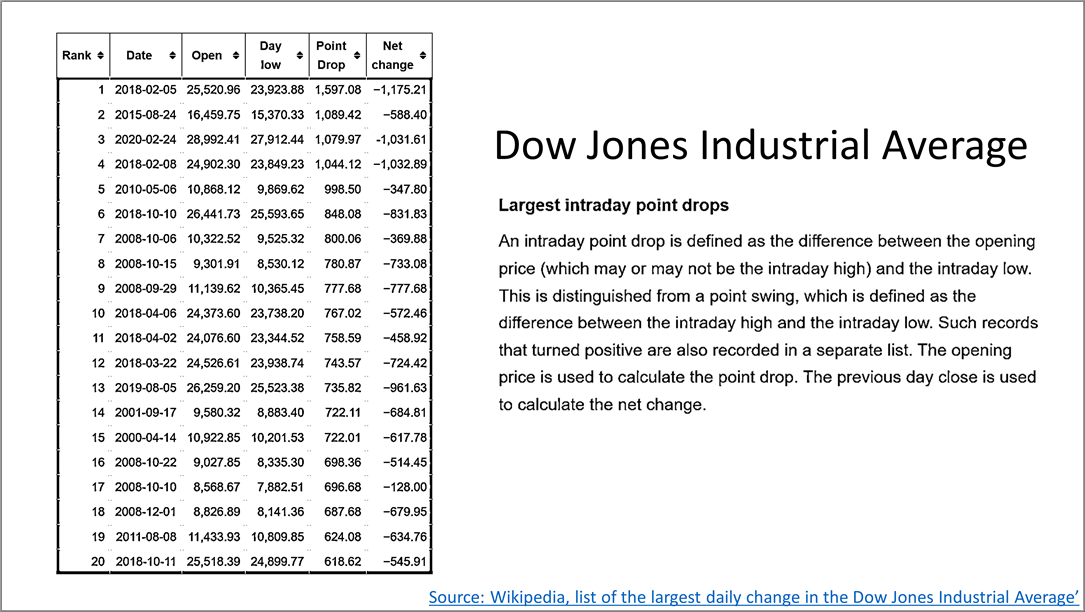Financial Fears Over Coronavirus
Published Tuesday February 25, 2020, 7:30 p.m. ET
(Tuesday February 25, 2020, 7:30 p.m. ET) — With nervousness that the Coronavirus pandemic is spreading, financial economic fears are spiking. The Dow Jones Industrial Average fell more than a thousand points Monday and, on Tuesday, trading on Wall Street closed after another 888-point plunge.
"We are asking the American public to prepare for the expectation that this might be bad," a spokesperson for the U.S. Center for Disease Control said Tuesday.
Amid the worldwide health threat and mounting human toll, TV financial anchors are talking faster and fanning fears. Here's some perspective.
A thousand-point drop just isn't what it used to be. When the Dow traded at 20,000 about three years ago, a 1000 point decline was a 5% loss. With the widely-watched index recently breaking 30,000, a 1,000-point decline is a 3.3% loss. A decade ago, the Dow traded at 10,000 and a 1000-point drop was equivalent to a 10% loss in value. So discount the frightening reports about point drops.
Remember the basic axiom of investing in common stocks: over the long-term investors earned a premium for owning equities precisely because they expose themselves to price volatility, also known as risk.
Past performance cannot guarantee future results, but a rubric of modern portfolio theory taught at colleges and universities holds that investors get paid extra return for taking risks.
The risk premium is the amount you get paid for owning a risky asset and it might be wise to keep this fundamental financial concept in mind on days like today: Whenever stocks plunge, you earn the equity risk premium.
Nothing contained herein is to be considered a solicitation, research material, an investment recommendation or advice of any kind., and it is subject to change without notice. Any investments or strategies referenced herein do not take into account the investment objectives, financial situation or particular needs of any specific person. The material represents an assessment of financial, economic and tax law at a specific point in time and is not a guarantee of future results.
The Dow Jones Industrial Average (DJIA) is a price-weighted average of 30 actively traded "blue chip" stocks, primarily industrials, but includes financials and other service-oriented companies. The components, which change from time to time, represent between 15% and 20% of the market value of NYSE stocks. Its past performance does not guarantee future results.
Neither Asset Allocation nor Diversification guarantee a profit or protect against a loss in a declining market. They are methods used to help manage investment risk.
This article was written by a professional financial journalist for Preferred NY Financial Group,LLC and is not intended as legal or investment advice.
An individual retirement account (IRA) allows individuals to direct pretax incom, up to specific annual limits, toward retirements that can grow tax-deferred (no capital gains or dividend income is taxed). Individual taxpayers are allowed to contribute 100% of compensation up to a specified maximum dollar amount to their Tranditional IRA. Contributions to the Tranditional IRA may be tax-deductible depending on the taxpayer's income, tax-filling status and other factors. Taxed must be paid upon withdrawal of any deducted contributions plus earnings and on the earnings from your non-deducted contributions. Prior to age 59%, distributions may be taken for certain reasons without incurring a 10 percent penalty on earnings. None of the information in this document should be considered tax or legal advice. Please consult with your legal or tax advisor for more information concerning your individual situation.
Contributions to a Roth IRA are not tax deductible and these is no mandatory distribution age. All earnings and principal are tax free if rules and regulations are followed. Eligibility for a Roth account depends on income. Principal contributions can be withdrawn any time without penalty (subject to some minimal conditions).
© 2024 Advisor Products Inc. All Rights Reserved.




